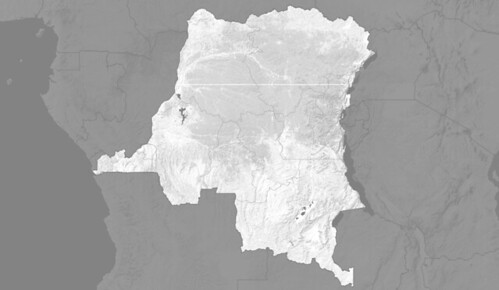Community mapping in Equateur Province
In February 2014, the Moabi team and University College London’s (UCL) Extreme Citizen Science (ExCiteS) research group led a community mapping training mission to Equateur province, DRC. The aim of the mission was to increase the capacity of Congolese civil society organisations to engage local indigenous communities in making their own geo-located maps, using methods and tools developed by ExCiteS. The resulting community maps can be uploaded to the Moabi platform, providing a vital layer of data concerning the situation on the ground in DRC’s forests as experienced by indigenous people.
Mapping Technology for Everybody
The ExCiteS research group is developing a digital mapping platform, called Sapelli, which is designed to allow GPS points and other kinds of data to be collected by anyone – including people who are non-literate and have no prior experience using digital technology. Sapelli runs on rugged Android smartphones and has an adaptable interface that is entirely picture-based, so it can be navigated by indigenous people who have no written language or number system.
Creating a Tailored Mapping Application for Botike Village
The training mission took place in a village called Botike, which sits within the logging concession of Lebanese firm Bakri Bois Corporation (BBC). Working with the indigenous Tswa (Pygmy) population of Botike, the training mission created a tailored Sapelli application, co-designing the pictures that make up the interface with local people in order to ensure they were both understandable and relevant to their needs. This co-development took place within a methodology comprising a detailed Free Prior and Informed Consent (FPIC) process, and the building of community protocols to ensure that the Tswa were able to engage with the project on their own terms. The Sapelli application developed with the Tswa in Botike had three principle functions: 1) Mapping important local resources 2) Recording evidence of the impact of logging activity 3) Recording the outcome of consultations with BBC
Mapping Local Resources in Botike
Following two days spent training the people of Botike to use Sapelli and gathering feedback on each of the functions, the application was tested in a mapping exercise with three groups - two groups each of ten men and one group of six women. Each group mapped a range of sites important for their livelihood and religious activities, and throughout the exercise gave detailed explanations of resources – such as plants used to make tools, sources of freshwater and locations where honey and edible ants can be found – that they felt should be added to the application in order to make their map more complete.
Mapping the Impacts of Logging in Botike
During the field mission it became clear that relations between the population of Botike and the concession holder BBC are poor - although local people are still able to access the forest to hunt and gather food, the company has cut down many of the caterpillar trees on which the Tswa are dependent in the dry months when there is little else to eat. The Tswa participants recorded the GPS locations of the destroyed resources to add to their map, and also took photos to provide additional evidence of the impact of logging. A group of elders used the final section of the application to register that while there has been some limited consultation with local people, BBC have kept none of their promises (eg. to help with school fees for their children), and the community does not benefit at all from the exploitation taking place in their forest.
Follow-up with Bakri Bois Corporation
Following the field mission, the Moabi team attempted to contact both BBC and the Governor of Equateur Province to present the map made by the people of Botike and ask for comment. So far the Governor has not responded, while BBC has moved from its official address without informing the Ministry for the Environment, Conservation and Nature. These conflicts illustrate a broader risk of confrontation between indigenous communities and extractive industries across DRC.
Featured Map Layers
Click on a layer to add it to the map
- Indigenous Lands
- Logging Concessions
- Agriculture Concessions
- Road Rehabilitation Projects
- UMD Forest Loss (2000 - 2014)
- UMD Forest Cover (2000)
